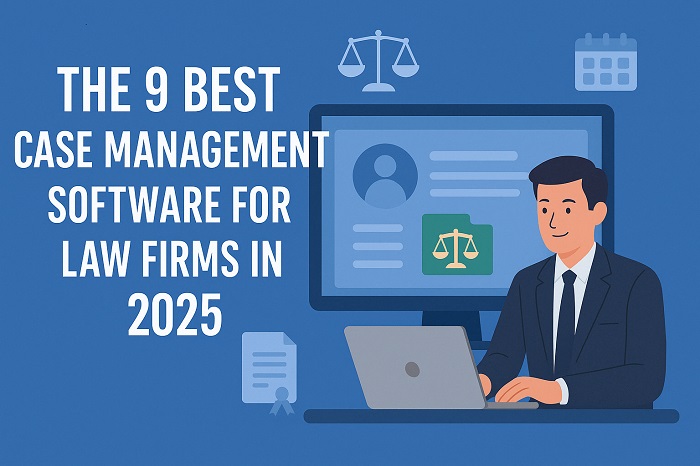Law firms handle more data and cases than ever before. Deadlines, court filings, client records must be accurate and fast. Manual processes no longer keep up. Mistakes cost time, clients, and reputation. Now, legal technology gives firms the tools to stay ahead. Case management software is no longer optional. It is a core part of every successful law firm in 2025.
These platforms do more than store documents. They track deadlines, streamline billing, manage contacts, and improve client communication. Most importantly, they save time. In fact, artificial intelligence will be the best case management software for law firms in 2025. It automates routine work and provides real-time insights, allowing lawyers to focus on what matters—winning cases. Choosing the right software depends on your firm’s size, practice area, and workflow needs. Some tools offer deep customization. Others focus on simplicity. Some are best for solo attorneys, while others suit large teams.
This guide reviews the 9 best case management software platforms for law firms in 2025. It compares features, pricing, and performance. It also reveals overlooked features other resources miss. Let’s explore the options helping thousands of law firms lead the legal industry in 2025.
Key Features That Make Case Management Software Essential
Law firms in 2025 demand more from their software than ever before. The complexity of managing growing caseloads, compliance demands, and remote teams means that case management platforms must deliver on multiple fronts. To be considered essential, modern case management software must offer not only efficiency but also security, flexibility, and intelligent insights.
The most impactful features address core legal tasks—such as document storage, time tracking, billing, calendaring, and communication—within one unified interface. But truly indispensable systems go further by offering automation, artificial intelligence, and seamless integration with a firm’s other tools. This reduces the time lawyers spend on repetitive tasks and allows them to focus more on strategy, advocacy, and client engagement.
Here are the key features that define essential case management software in 2025:
1. Centralized Case and Document Management
All case files, client communications, contracts, and court forms are stored in one place. Advanced search and tagging allow quick retrieval across thousands of records.
2. Automated Workflows and Task Management
Legal tasks are assigned automatically based on the case stage. Deadlines are tracked in real time, and reminders prevent missed court dates.
3. Integrated Time Tracking and Billing
Built-in timers log billable hours as lawyers work. Invoices are generated instantly, and payment portals help firms get paid faster.
4. Secure Client Portals
Clients can log in to view their case progress, upload documents, and send messages. This enhances transparency and reduces time spent on calls.
5. E-Signature and Intake Tools
Customizable forms and e-signature functionality make onboarding clients faster and more compliant with digital standards.
6. Analytics and Reporting
Visual dashboards show which cases generate the most revenue, which team members are overloaded, and where improvements can be made.
7. AI and Predictive Tools
Advanced platforms like Clio and Litify use AI to recommend deadlines, flag risks, and suggest legal strategies based on similar cases.
8. Mobile and Cloud Accessibility
Attorneys can access all case files securely from any device. This supports hybrid and remote work without sacrificing security.
9. Compliance and Security Features
Top software uses encryption, multi-factor authentication, and secure data backups to meet industry standards like HIPAA and GDPR.
10. Seamless Integrations
Case management tools must connect easily with email platforms, accounting software, calendaring apps, and legal research tools. This creates a frictionless digital ecosystem for every user.
These features are not just nice-to-haves—they are fundamental in helping modern law firms thrive in an increasingly competitive and tech-driven landscape.
Bonus Features Law Firms Shouldn’t Overlook in 2025
Many articles stop at basic features, but true innovation lies in the extras. These bonus features offer strategic advantages for firms seeking to stay ahead. Whether it’s protecting client data or promoting sustainability, the best platforms go beyond billing and case tracking.
1. Data Security Protocols
Cybersecurity is critical in legal tech. Platforms like Litify and Filevine now offer blockchain validation and zero-trust architecture. This ensures every access point is verified, reducing the risk of breaches and ensuring GDPR and HIPAA compliance.
2. AI-Driven Insights
AI isn’t just about automation. Platforms like Clio use it for predictive analytics—helping law firms forecast litigation timelines, flag bottlenecks, and suggest best practices. This empowers firms to plan staffing, reduce waste, and deliver better outcomes.
3. Mobile-First Interface
Clients expect mobile access to case updates. MyCase and PracticePanther stand out with dedicated mobile apps—not just browser versions. This ensures smoother client communication and real-time updates during hearings or depositions.
4. Sustainability Metrics
Modern law firms want to reduce environmental impact. Litify and CloudLex now offer dashboards showing how much paper, travel, and carbon output has been saved using digital tools. These metrics support ESG goals and impress corporate clients.
Let’s explore the software helping thousands of law firms lead the legal industry in 2025.
Clio: Comprehensive Cloud-Based Solution for Every Firm Size
Clio is widely recognized as a market leader in legal tech. It offers everything from matter management to billing under one cloud-based platform. Whether you’re a solo practitioner or part of a large firm, Clio adapts to your needs. Its user interface is intuitive, its customer support is excellent, and its ecosystem integrates with more than 200 apps. This makes Clio an ideal hub for all your legal operations.
Overview:
Clio stands out as a leading cloud-based legal practice management software, offering a wide range of features suitable for law firms of all sizes.
Key Features:
- Case and document management
- Time tracking and billing
- Secure client portal
- Integration with tools like Microsoft Teams and QuickBooks
- AI-powered document automation
Why Choose Clio:
Clio’s versatility and user-friendly interface make it ideal for firms seeking a comprehensive solution to manage various aspects of legal practice efficiently. It reduces time spent on repetitive tasks, centralizes communication, and simplifies compliance tracking. In 2025, its AI tools go even further—offering smart recommendations and auto-filling for repetitive legal documents.
MyCase: All-in-One Platform for Small to Medium Firms Seeking Simplicity
MyCase is designed for firms that want a comprehensive system without a steep learning curve. It excels in accessibility, affordability, and ease of use. Built for growing teams, it combines essential legal functions into a single platform—allowing small and medium firms to manage operations like a big firm, but without the complexity.
Overview:
MyCase offers an integrated platform that simplifies case management, billing, and client communication, catering especially to small and medium-sized law firms.
Key Features:
- Case and document management
- Client intake and communication tools
- Integrated billing and payments
- E-signatures
- AI-powered medical chronologies
Why Choose MyCase:
MyCase’s intuitive design and comprehensive features streamline legal workflows, enhancing productivity and client satisfaction. It reduces the back-and-forth between clients and attorneys and includes mobile apps for on-the-go access. The AI features also help build timelines for personal injury cases by organizing medical records quickly and accurately.
SmartAdvocate: Tailored for High-Volume Litigation Teams
SmartAdvocate was built with one thing in mind—handling large case volumes efficiently. It’s especially valuable for personal injury, mass tort, and class action law firms. The software tracks thousands of moving parts and delivers automation to support paralegals, attorneys, and case managers working in complex legal environments.
Overview:
SmartAdvocate is designed for law firms handling high-volume personal injury or mass tort cases, offering robust features to manage complex litigation processes.
Key Features:
- Advanced case management tools
- Document automation
- Comprehensive reporting and analytics
- Integration with third-party applications
Why Choose SmartAdvocate:
SmartAdvocate’s specialized tools enhance efficiency and case tracking, making it a valuable asset for firms dealing with intricate legal matters. Its dashboards are built to visualize deadlines, medical chronologies, settlement amounts, and litigation stages—all in real time. This saves hours in staff coordination and ensures nothing slips through the cracks.
CASEpeer: Optimized Case Management for Personal Injury Law Firms
CASEpeer is engineered specifically for personal injury practices. Its feature set is built around intake efficiency, communication clarity, and fast settlement turnaround. If your firm’s core practice is PI, this tool is tailored to make your workflow leaner and more responsive.
Overview:
CASEpeer is tailored specifically for personal injury law firms, focusing on client intake and settlement tracking to streamline case management.
Key Features:
- High-volume intake management
- Settlement tracking
- Real-time case tracking
- Integration with e-signature platforms and communication tools
Why Choose CASEpeer:
CASEpeer’s specialized features cater to the unique needs of personal injury practices, enhancing client communication and case efficiency. Its interface is straightforward but powerful—automating follow-ups, reducing data entry, and making your firm appear more responsive to clients and insurers.
Filevine: Customizable Workflows and Reporting for Flexible Firms
Filevine stands out in the legal tech space for its deep customization and powerful workflow automation. It’s a platform built for law firms that don’t want to conform to rigid templates. Whether you’re handling litigation, corporate law, or regulatory compliance, Filevine gives you the freedom to tailor your case management exactly the way your team works.
Unlike many generic systems, Filevine thrives in complexity. It empowers law firms to build their own automation rules, approval pipelines, and client touchpoints. This makes it particularly useful for firms managing multiple practice areas, diverse clients, or hybrid legal teams.
Overview:
Filevine offers customizable workflows and robust reporting capabilities, making it suitable for firms requiring tailored case management solutions.
Key Features:
- Customizable workflows
- Centralized lead management
- Document and task management
- Advanced reporting capabilities
Why Choose Filevine:
Filevine’s emphasis on customization allows firms to adapt the software to their specific needs, improving overall efficiency. Teams can track every deadline, assign tasks based on triggers, and build personalized dashboards. The system integrates with tools like Zapier, Slack, and Google Workspace, extending its capabilities even further. If your firm values data-driven decisions and cross-team collaboration, Filevine delivers.
CloudLex: Cloud-Based Solution for Plaintiff Law Firms
CloudLex is designed specifically for plaintiff personal injury law firms. What sets it apart is its commitment to the plaintiff-side workflow—supporting every step from intake to settlement. The cloud-first architecture allows seamless access for distributed teams and supports integrations with litigation support tools, e-discovery platforms, and CRM systems.
In 2025, CloudLex also shines with its analytics dashboards, helping firms track digital savings from e-filing and remote meetings. It’s not just tech-forward—it’s eco-conscious and business-aware.
Overview:
CloudLex is designed exclusively for plaintiff personal injury law firms, offering a cloud-based platform to manage legal operations effectively.
Key Features:
- Matter management
- Client intake automation
- Legal document management
- Integration with various tools
Why Choose CloudLex:
CloudLex’s specialized features cater to the specific requirements of plaintiff law firms, enhancing case management and client service. It reduces overhead by centralizing data and tasks into a single, cloud-based dashboard. With compliance tools built-in and access logs for every action, CloudLex ensures firms stay audit-ready and legally compliant.
PracticePanther: User-Friendly Interface with Extensive Integrations
PracticePanther offers a modern, intuitive user experience paired with powerful integrations. It’s designed for law firms that prioritize both ease of use and automation. This makes it ideal for small to mid-sized firms looking to grow while staying lean.
In addition to case tracking, PracticePanther offers marketing automation tools—something not often found in legal software. It also provides a native client portal, enabling faster communication without the need for emails or phone calls.
Overview:
PracticePanther offers a user-friendly interface combined with extensive integration capabilities, suitable for firms seeking flexibility and scalability.
Key Features:
- Case management
- Time tracking and billing
- Customizable reports and intake forms
- Workflow automation
Why Choose PracticePanther:
PracticePanther’s flexibility and integration options make it a practical choice for growing law firms aiming to enhance productivity. It connects with over 30 third-party apps including payment processors, CRMs, and document tools. The result is an end-to-end solution that reduces friction and maximizes efficiency from day one.
Litify: Salesforce-Based Solution for Large Firms and Enterprises
Litify redefines what legal case management looks like for large and enterprise-level law firms. Built on Salesforce, it provides unmatched scalability, data analytics, and automation. Unlike traditional systems, Litify serves as a true operational hub for legal business intelligence.
Its dashboards offer powerful reporting on KPIs, litigation outcomes, staff performance, and more. That’s why in 2025, more firms are switching to Litify not just for case management—but for strategic planning.
Overview:
Litify leverages the Salesforce platform to provide a scalable and customizable solution, ideal for large law firms and enterprises.
Key Features:
- Built on Salesforce platform
- Customizable workflows
- Comprehensive reporting and analytics
- Integration with various legal tools
Why Choose Litify:
Litify’s scalability and customization options make it suitable for large firms seeking a robust case management system. From intake to closure, the platform supports automation, client communication, and firm-wide analytics. Legal teams using Litify report shorter case cycles and higher client retention, thanks to centralized data visibility.
Parley: AI-Powered Application Assembly for Immigration Law
Parley is one of the most innovative solutions for immigration law in 2025. Unlike general-purpose case management tools, Parley focuses specifically on immigration forms, visa timelines, and regulatory compliance. With built-in templates and AI-generated legal documents, firms can cut preparation time by more than half.
The platform supports common visa types, naturalization forms, and asylum paperwork. It also integrates with popular immigration portals, reducing manual uploads and double entries. For firms handling multiple jurisdictions or visa categories, Parley is a productivity multiplier.
Overview:
Parley uses AI to simplify immigration case management. Law firms can handle more applications with better accuracy and speed.
Key Features:
- AI-generated legal letters
- Smart document organization
- Templates for various visa types
- Integration with immigration portals
Why Choose Parley:
Parley reduces paperwork and increases output for immigration firms. Its AI tools cut down hours of manual effort. For solo immigration attorneys or boutique firms, Parley provides enterprise-grade tools at an affordable cost. It’s built for compliance, efficiency, and client satisfaction.
Feature Comparison Table: Evaluating the Top Software Platforms Side-by-Side
Choosing the best case management software in 2025 requires more than a simple feature checklist. Firms must consider how each platform aligns with their daily operations, client expectations, and long-term goals. This feature comparison table summarizes the most critical factors—AI tools, billing, customization, cloud access, and integration—to help legal professionals identify the best fit for their needs.
Use this table to quickly assess which platform matches your firm’s priorities. Whether you’re a solo immigration lawyer or managing a 50-attorney litigation practice, this side-by-side breakdown clarifies what each tool excels at.
| Software | Best For | AI Tools | Billing | Custom Workflows | Cloud-Based | Integration Level |
| Clio | All firm sizes | Yes | Yes | Medium | Yes | High |
| MyCase | Small to mid-sized firms | Yes | Yes | Medium | Yes | High |
| SmartAdvocate | Personal injury/mass tort | Yes | Yes | High | Yes | High |
| CASEpeer | Personal injury firms | Limited | Yes | Low | Yes | Medium |
| Filevine | Customization-focused | Yes | Yes | Very High | Yes | High |
| CloudLex | Plaintiff law firms | Yes | Yes | Medium | Yes | Medium |
| PracticePanther | Growing and mid-sized | Limited | Yes | High | Yes | High |
| Litify | Large enterprise firms | Yes | Yes | Very High | Yes | Very High |
| Parley | Immigration law firms | Yes | No | Low | Yes | High |
Key Benefits of Using Case Management Software in 2025
Legal case management software is more than a tech upgrade—it’s a business asset. Firms that embrace these tools save time, generate more revenue, and offer superior client service. In 2025, these platforms are optimized for hybrid teams, cloud collaboration, and strategic forecasting.
✅ Save Time and Boost Revenue
Automated reminders, billing, and document assembly mean lawyers can spend more time on client strategy and court prep. More productivity leads to higher billables.
✅ Improve Client Communication
Integrated client portals, SMS updates, and smart notifications allow clients to track progress without calling. That improves transparency and reduces overhead.
✅ Track Every Task
Nothing gets missed. From intake to discovery to settlement, every task is logged and tracked in real time.
✅ Remote Work Ready
Top tools are built for secure cloud access. Teams can log in from home, court, or a different continent—and still collaborate in real time.
✅ Stay Ahead of Competition
Law firms using smart dashboards and analytics close cases faster, deliver better results, and gain more five-star reviews.
Things to Consider Before Choosing Your Legal Software
Before selecting your firm’s software, assess current workflows, staffing levels, and practice areas. Ask questions that align with your specific needs. A software that’s perfect for a corporate law firm may not suit a high-volume PI practice.
Key Considerations:
- Does it integrate with your current stack (Zoom, Microsoft 365, QuickBooks)?
- Is it scalable for growth, especially if you plan to hire or expand?
- How intuitive is the user interface for non-tech-savvy users?
- What kind of onboarding, training, and ongoing support is provided?
- Is your data stored on encrypted, GDPR-compliant servers?
These questions can prevent future headaches and ensure long-term success.
Pricing Snapshot (As of Q2 2025)
Pricing plays a major role in selecting legal software. Most vendors offer monthly subscriptions, with discounts for annual plans. Below is a current snapshot. Prices vary based on features, number of users, and contract length.
| Software | Starting Monthly Price (USD) | Free Trial | User Limit |
| Clio | $39 per user | 7 days | Unlimited |
| MyCase | $49 per user | 10 days | Unlimited |
| SmartAdvocate | Custom pricing | No | Custom |
| CASEpeer | $65 per user | 14 days | Unlimited |
| Filevine | Custom pricing | No | Custom |
| CloudLex | $89 per user | Demo only | Unlimited |
| PracticePanther | $59 per user | 7 days | Unlimited |
| Litify | Enterprise-level pricing | No | Custom |
| Parley | $30 per case | Demo only | Unlimited |
Note: Always confirm pricing directly with vendors. Most offer demos, trials, or custom quotes based on your firm’s needs.
Conclusion: The Best Case Management Software for Law Firms in 2025
Technology shapes the future of legal practice. The best law firms already rely on automation and smart platforms. They no longer juggle spreadsheets or paper folders. They choose tools that organize everything in one place.
In 2025, the best case management software for law firms does more than manage cases. It improves client experience, speeds up billing, and predicts outcomes. It adapts to your team and grows with your firm.
This article ranked the top 9 platforms. Each software meets different needs. Clio and MyCase offer simplicity and scale. Filevine and SmartAdvocate bring power to complex practices. Parley leads immigration innovation. Litify transforms enterprise firms.
Now is the time to choose smart. The right platform saves time, increases revenue, and improves client trust. Evaluate your firm’s needs. Match them with the features that matter most. Then, make the switch. Success in 2025 depends on more than legal skill. It depends on the systems you use every day. Upgrade wisely. Let your software give you the edge.
Frequently Asked Questions (FAQs)
What is case management software for law firms?
Case management software is a digital platform designed to help law firms streamline operations. It consolidates case tracking, document storage, billing, scheduling, and client communication into one centralized system. By digitizing these workflows, it improves efficiency, reduces human error, and ensures deadlines and legal tasks are met with precision.
Why do law firms need case management software in 2025?
The volume and complexity of legal work have grown significantly. Manual systems are slow, error-prone, and incompatible with remote collaboration. Case management software in 2025 enables secure remote access, real-time collaboration, AI-powered insights, and automation of routine tasks—giving firms a serious competitive advantage.
Which is the best case management software for law firms in 2025?
There’s no one-size-fits-all answer. Clio is ideal for firms seeking an all-in-one solution. MyCase suits small to mid-sized firms. Filevine is perfect for firms needing extreme customization. Litify leads for enterprise use, while Parley dominates in immigration law with AI features.
Is cloud-based case management software secure?
Yes. Leading platforms use bank-level encryption, role-based access controls, GDPR compliance, and automatic backups. Some even use blockchain validation and zero-trust architecture. Security audits and certifications are standard in the best platforms.
Can small law firms afford this software?
Absolutely. Many platforms offer entry-level plans under $50 per user per month. Free trials, scalable pricing, and discounts for long-term or multi-user contracts make these tools accessible to solo attorneys and small firms.
Do these tools integrate with other legal or office software?
Yes. Integration is a key feature. Most tools connect with Microsoft Office, Outlook, Google Workspace, QuickBooks, Zoom, Dropbox, and legal research tools. APIs and third-party integrations reduce data duplication and boost productivity.
Is training included with case management software?
Most providers offer robust onboarding. This includes webinars, live support, video tutorials, and written guides. Some offer one-on-one training or a dedicated customer success manager to ensure a smooth transition.
Does AI really help in case management software?
Yes. AI tools assist with document automation, deadline tracking, case predictions, and smart data tagging. They reduce repetitive work, flag missed deadlines, and help legal teams work smarter and faster.
Can I switch to new software without losing old data?
Yes. Most platforms offer data migration support to transfer client information, documents, billing history, and calendar items. Firms should always request a demo of the import process before switching.




